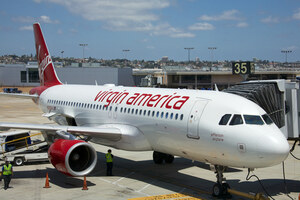 Today, California’s broad worker protections stand. Oman v. Delta Airlines is over and done with.
Today, California’s broad worker protections stand. Oman v. Delta Airlines is over and done with.But the airline industry isn’t done. Shaking off the wage and hour requirements of the California Labor Code is a top priority for the industry. A similar question is likely to come before the Supreme Court in the 2022-2023 Supreme Court session. The case to watch is Virgin America, Inc. v. Bernstein.
Virgin America’s petition for Supreme Court review
At the outset, it is important to recognize a basic Constitutional principle. Where federal law and state laws conflict and they govern exactly the same thing, federal preempts state law. This is the essence of the Supremacy Clause .
On August 23, 2021, Virgin America filed a petition for certiorari in the Supreme Court to consider whether a federal law, the Airline Deregulation Act preempts generally applicable state laws that have a significant impact on airline prices, routes, and services or whether it preempts these laws only if they bind an airline to a particular price, route, or service. It should be noted that, in the Ninth Circuit case, the Department of Justice submitted an amicus curiae brief in support of the airline’s position that broader preemption was warranted.
The petition was in response to a Ninth Circuit decision that through operation of the Commerce Clause, the Airline Deregulation Act (ADA) and Federal Aviation Act (FAA) preempted the wage and hour provisions of California labor law only to the extent that those laws bound (the operative word) airlines to certain prices, routes and services. In November 2021, the Supreme Court asked the Solicitor General of the United States to set out the position of the United States in the matter. This request is significant because the Court generally does not ask for an advisory brief unless it is interested in hearing the case. That brief is likely to drop early in the new Supreme Court term.
Complicated facts
Julia Bernstein and other plaintiffs were California-based Virgin America flight attendants. Approximately 25 percent of Virgin America’s flights were between California airports. Approximately 75 percent either took off or landed at a non-California airport, but the vast majority of those flights retained some connection to California. The flight attendants spent approximately a third of their time working within California’s borders. They apparently worked in no other state more than they worked in California.
In their class action lawsuit, the flight attendants claimed that Virgin America failed to pay minimum wage, overtime and for every hour worked. In addition, the flight attendants claimed that Virgin failed to provide required meal and rest breaks.
Virgin America took the position that it was not subject to California labor law because of the burden that state laws placed on interstate commerce. This is a Constitutional argument involving federal preemption of state law. The applicable federal laws are the Federal Aviation Act (FAA) and the Airline Deregulation Act (ADA).
Trial court decision trimmed back by Ninth Circuit
At trial, the District Court awarded summary judgment to the airline employees, holding that the California Labor Code applied to all work performed in California.
The Ninth Circuit agreed in part, reasoning that although the application of California law affected interstate commerce, it did not impose a substantial burden. It disagreed on the minimum wage claims, finding nothing illegal in Virgin America’s scheduling and payment scheme. The Ninth Circuit conceded that the FAA preempts state regulation with respect to airline safety, but concluded that California’s meal and rest break laws were only tenuously related to safety concerns. Consequently, those should not be preempted by the FAA.
The petition for certiorari
READ MORE CALIFORNIA LABOR LAW LEGAL NEWS
- the ADA preempts state laws that interfere with federal deregulation of airlines; and
- federal law regulates flight attendants’ duty and break periods.
The practical question is far more complex: Do the comprehensive protections of California labor law apply to interstate businesses? This term is likely to see a consequential answer, as the Supreme Court turns its attention away from gun, anti-abortion and religious rights laws and, in taking up Virgin America v. Bernstein, looks back to wage and hour issues.
